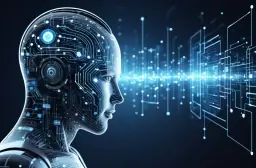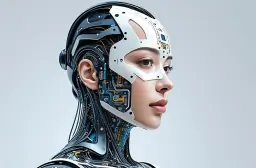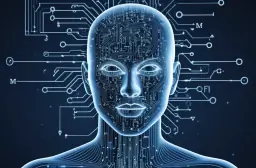How AI Transforms Daily Life: Smart Tech Innovation Unveiled
Table of Contents
In the past decade, artificial intelligence (AI) has moved from science fiction into our daily routines, making its presence felt in ways we never imagined. But what if we told you that AI is already revolutionizing the way we live, work, and interact with the world? From smart devices in our homes to predictive technology in our workplaces, the integration of AI has opened up new possibilities that we are only beginning to explore. How much do we really know about the impact AI has on our everyday lives?
AI’s transformation in daily life isn’t just about futuristic gadgets; it’s about the seamless integration of intelligent systems into the tools we use every day. Whether it’s the voice assistant that wakes you up in the morning, the smart refrigerator that tells you when you’re running low on groceries, or the machine learning algorithms that suggest your next Netflix binge, AI is enhancing our lives in ways that improve both productivity and convenience. But how much further can this technology go? What new possibilities are on the horizon?
This article dives into how AI is reshaping our daily experiences. We’ll look at the AI-powered solutions already enhancing productivity, convenience, and efficiency, and we’ll explore what the future holds for AI-driven living. Are we truly embracing the potential of artificial intelligence in our everyday lives, or are we just scratching the surface?
AI-Powered Solutions for Everyday Tasks
When we think of AI, many of us picture robots and complex algorithms. However, AI’s role in our daily lives is much more subtle yet impactful. AI-powered solutions are already being used to automate tasks that once required manual input, from scheduling meetings to controlling the temperature in our homes.
One of the most common examples of AI applications is smart home systems. These systems are powered by intelligent automation, which allows devices to interact with one another and with you in a way that adapts to your preferences. For instance, smart thermostats learn your heating and cooling preferences over time, adjusting automatically to maintain comfort without you needing to lift a finger.
Other everyday AI tools, such as voice assistants, enable us to complete tasks hands-free. From setting reminders to making shopping lists, these devices are a constant source of assistance in our routine lives, offering unparalleled convenience and efficiency.
- AI household management: Smart devices like robotic vacuum cleaners and smart speakers streamline the upkeep of our homes.
- Predictive technology: AI analyzes past behaviors to offer recommendations for daily activities, improving productivity and satisfaction.
- AI-driven lifestyle: Personal AI assistants cater to individual needs, from health tracking to entertainment suggestions.
Transforming the Workplace with AI

AI’s influence stretches far beyond the home, extending into the workplace, where it’s enhancing productivity, streamlining operations, and improving decision-making. Cognitive computing tools allow businesses to automate routine tasks, freeing employees to focus on more complex and creative work.
In offices, AI-driven systems are being implemented to manage emails, schedule meetings, and even write reports. These AI-powered solutions are not only saving time but also reducing errors and improving overall efficiency. Intelligent systems learn over time, becoming increasingly adept at anticipating needs and offering helpful suggestions.
One remarkable advancement in workplace AI is AI for productivity. With tools that can analyze vast amounts of data and provide insights, businesses are using AI integration to create more personalized, efficient work environments. For example, machine learning algorithms are increasingly being used to predict trends in business operations, helping managers make informed decisions in real time.
- Automated tasks: AI is handling everything from customer service inquiries to invoicing, leaving more room for strategic work.
- Intelligent automation: These systems adapt to changing business conditions, offering smart solutions tailored to specific organizational needs.
- AI-driven decision-making: Data analytics powered by AI helps businesses predict future outcomes with greater accuracy.
Smart Devices Enhancing Daily Living
Smart technology isn’t just confined to our homes or workplaces—smart gadgets are making their way into all areas of our lives. Wearable devices like fitness trackers and smartwatches are equipped with AI to monitor our health, track activities, and offer personalized feedback. These AI-powered tools not only help us stay fit but also provide real-time health insights, which can be crucial for proactive care.
Smart personal assistants like Amazon’s Alexa and Google Assistant have made it possible to interact with technology in a completely natural and intuitive way. From ordering groceries to controlling home lighting, these systems enhance the user experience with seamless AI interaction. Furthermore, AI personalization ensures that the services we use are tailored to our individual preferences, creating an increasingly tech-enhanced life.
- Virtual helpers: Voice-controlled assistants act as digital concierges, managing everything from daily to-do lists to complex requests.
- Predictive AI: Devices learn from patterns in your behavior, anticipating your needs before you even ask.
- Smart gadgets: AI applications make everyday devices like refrigerators, televisions, and even cars more intelligent and adaptive.
The Role of Robotics in Daily Life

Another exciting facet of AI’s role in daily life is its use in robotics. Robotics in daily life goes far beyond the realm of industrial automation, with robots now being introduced to perform tasks that were once considered out of reach. Whether it’s AI-powered robots designed to assist in elderly care or delivery drones bringing packages to your doorstep, the presence of robotics is increasing.
These robots utilize AI-driven systems to interact with their environment, solve problems, and learn from experience. In the home, robotic vacuums are perhaps the most common example of how AI is applied in our personal spaces. These robots use machine learning to navigate, clean, and even adapt to the layout of your home.
- Automated living: AI-powered robots handle a variety of household tasks, improving efficiency and convenience.
- AI for elderly care: Robotics is helping seniors with daily activities, promoting independence and improving quality of life.
- Smart delivery systems: Drones and autonomous vehicles powered by AI are starting to transform how we receive goods.
How AI Personalizes Our Experiences
AI’s ability to personalize experiences is one of its most compelling features. From AI-driven lifestyle apps that suggest personalized workouts to machine learning algorithms that curate your music playlist, AI is shaping how we consume content and make decisions. The more we interact with these systems, the better they become at understanding our preferences, leading to a more tailored and enjoyable experience.
In the world of e-commerce, AI personalization allows businesses to suggest products based on your previous purchases, browsing history, and even social media activity. Similarly, predictive AI is increasingly used in entertainment to recommend movies, shows, or music that align with your tastes, making your tech-enhanced life even more enjoyable.
- Customized experiences: AI systems learn what you like and offer suggestions accordingly, improving satisfaction.
- Smart recommendations: Algorithms analyze data to provide personalized content and products, ensuring you get exactly what you need.
- Personalized AI assistants: Virtual helpers adapt to your lifestyle, offering tailored advice and assistance.
Frequently Asked Questions
What are some common AI applications in daily life?
AI is used in various ways, including voice assistants, smart home devices, fitness trackers, and personalized recommendations in apps and websites.
How does AI improve productivity at work?
AI helps by automating tasks like scheduling, emails, and reporting, enabling employees to focus on more complex, creative tasks while reducing errors and saving time.
What is predictive technology in AI?
Predictive technology in AI uses data and patterns to anticipate future actions or needs, offering solutions before they are even requested.
Can AI make my home smarter?
Yes, AI-powered solutions in smart homes, such as automated lighting, temperature control, and voice assistants, make everyday living more convenient and efficient.
What is the future of AI in everyday life?
The future promises even greater integration, with smarter robotic devices, personalized AI assistants, and automated tasks, all contributing to a seamless, tech-enhanced lifestyle.
Conclusion
AI is no longer just a futuristic concept—it’s already transforming the way we live, work, and interact with technology. From smart homes to personalized experiences and AI-driven productivity at work, the potential of AI to improve our lives is vast. As we continue to embrace AI advancements, it’s clear that intelligent automation and smart technology are here to stay.
As AI evolves, its role in daily life will only expand, offering new opportunities for productivity, convenience, and efficiency. By integrating AI-powered solutions into more aspects of our routine, we can look forward to a future where our lives are smarter, more connected, and seamlessly enhanced by technology.











